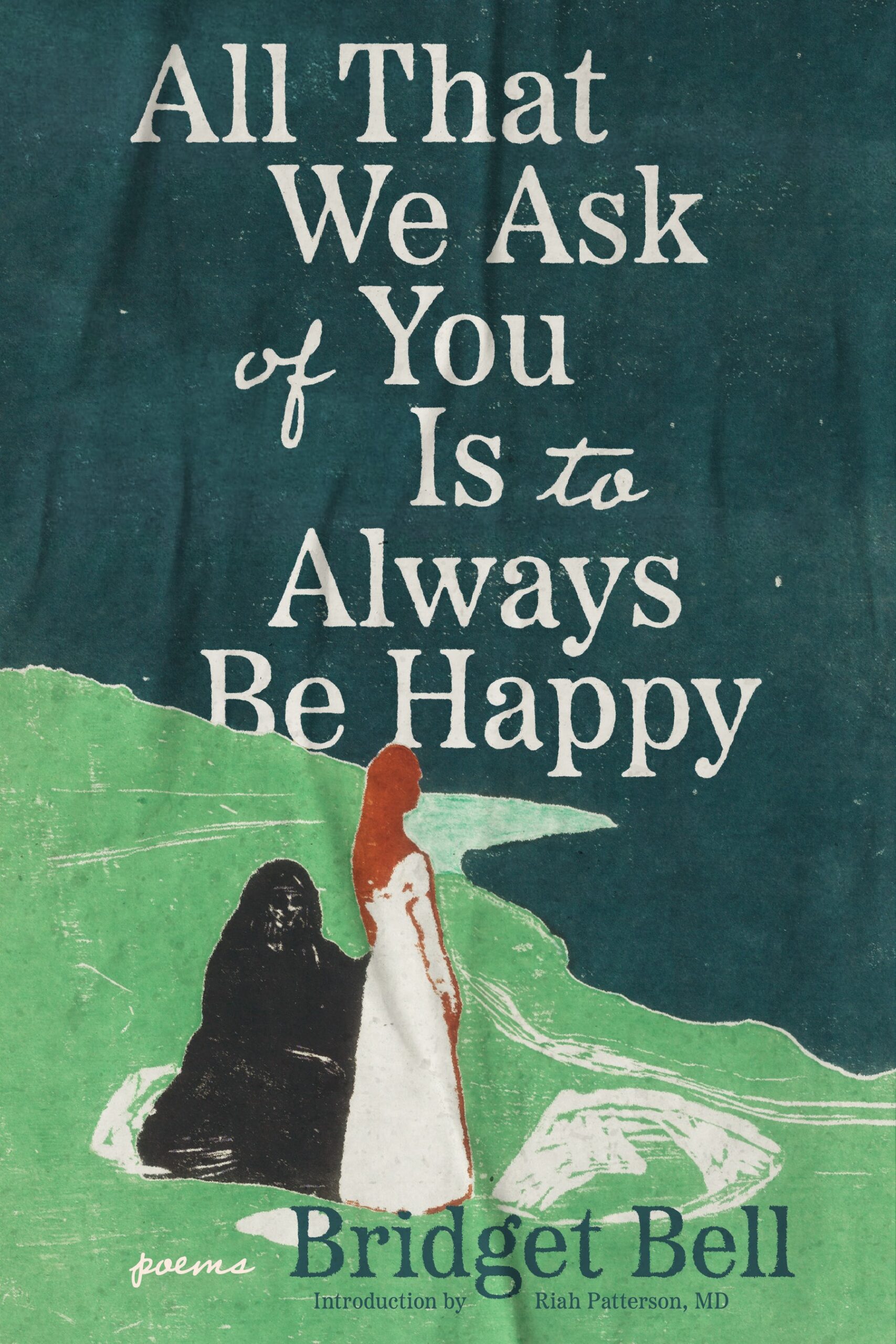
All That We Ask of You Is to Always Be Happy
Bridget Bell
CavanKerry Press
$18.00 (paperback)
Publication Date: February 4, 2025
Sophia Saco: “This Is How You Lose Your Body” was originally published in The Florida Review, and it’s exciting to see the poem again in your collection All That We Ask of You Is to Always Be Happy. Can you speak to the changes in this poem, and perhaps the collection itself, since its original publication?
Bridget Bell: When I originally wrote “This Is How You Lose Your Body,” I was super into enjambment; I love the way enjambment can create interesting double meanings on the line break and how it can function to pull a reader through the poem. However, during the editorial process, I worked with Baron Wormser, and he suggested that I organize the stanzas according to the sentences rather than letting the sentences meander so much. I made that edit based on his suggestion, and I think the new lineation creates a more urgent tone. In fact, most of the revisions I made to the full-length manuscript had to do with lineation and stanza changes.
Sophia Saco: Postpartum depression is a “common complication” that often goes undiagnosed, as mentioned in the introduction by Dr. Riah Patterson. I was particularly passionate about your collection for its unabashed honesty regarding this seemingly “taboo” subject. Your poems investigate postpartum life from all sides to achieve a nuanced and tangible depiction. What craft challenges did you face in the rendering of these depictions?
Bridget Bell: I think the biggest craft challenge was finding the right form for the right content. Postpartum life is so wild, particularly if you are struggling with perinatal mood disorders (PMADs) with symptoms that are all over the map. Some symptoms like intrusive thoughts or ruminations feel very cyclical while other symptoms like disassociation or hopelessness feel very unmoored. It was interesting for me to see how the use of strict form or the total lack of form could connect to the content of each poem. For example, “Sleep Deprivation,” which is one of the least structured poems in the collection, with inconsistent stanza lengths and lines that jump all over the page, tries to mimic how fractured reality can feel when you are sleep deprived. That broken form works for the broken feeling engendered by sleep deprivation. It was a lot of fun to play with that intersection of the emotional content and the form for each poem.
Sophia Saco: “I Worry About Women” mentions Sylvia Plath and Charlotte Perkins Gilman. The last lines are rife with satisfaction: “To be able to reach up with my bare palm / and crush an insect’s ancient back.” Would you say that All That We Ask of You Is to Always Be Happy is in conversation with the work of women writers whose anxieties were dismissed? If so, is the collection in conversation with other specific writers?
Bridget Bell: The collection is absolutely in conversation with the work of women writers whose anxieties were dismissed, and not just with women writers, but women in general. That same poem you reference starts with the speaker worrying about women “in 1957 Leetonia, Ohio with nothing useful to stop / the babies from coming.” That line was inspired by my grandma who had my dad when she was sixteen and went on to have eight more kids. It hurts me to think about what her postpartum experience must have been like. The poem “Escape” is in conversation with Judy Garland—when I was depressed, I’d quietly sing “Somewhere Over the Rainbow” to my daughter because I was comforted by its sad longing. “Dangerous for Mothers” is in conversation with Connie Voisine’s “Dangerous for Girls,” which if you have not read, you should read. It’s amazing, and it’s also deeply rooted in the idea of dismissing female anxieties.
Sophia Saco: I’m interested in your use of strict forms, as in “Sestina In Which The World Fails To Tell You About The Tedium,” as well as your critical look at postpartum complications. I see a connection between the sestina framing the speaker’s monotony (without escape) and the tendency of medical professionals to send patients in circles (without answers). Are there other moments in the collection that function similarly?
Bridget Bell: I love how you describe the sestina working in that poem—thank you! It felt like the perfect form to capture an idea that so many people gloss over, which is that infants are boring. With a new baby, your days repeat and your nights repeat and they all start to blur together. I hoped the loops of the sestina would capture that idea. I also use the sonnet a few times throughout the collection, and I think that form functions similarly. For me, the iambic pentameter in sonnets is a bit sing-songy—almost like the nursery rhyme of poetry, so it felt like a natural form to use to sort of poke fun at the idealized “nursery rhyme” version of motherhood. I also felt like the sonnet mimicked that subversive, dark side of nursery rhymes—that ABAB CDCD rhyme scheme can be a bit mocking in its perfection.
Sophia Saco: All That We Ask of You Is to Always Be Happy weaves several epigraphs into the fabric of the collection, from section breaks to singular poems. Barbara Ras’s “A Wife Explains Why She Likes Country” and Anne Carson’s “The Glass Essay” are two among many. In the book’s acknowledgements, you also thank the researchers whom you reference, noting their work on maternal mental health. Can you elaborate on your influences for this collection, both obvious and subtle?
Bridget Bell: Writing and reading were such huge parts of my recovery process when I was suffering from postpartum depression, and the idea of being in communication with other women—even on a figurative level—through my writing has always appealed to me. When I’m stuck on a poem, I often go back and reread certain poems that I love. Barbara Ras’s “A Wife Explains Why She Likes Country” and Carson’s “The Glass Essay” are two of those poems. So is Connie Voisine’s “Dangerous for Girls.” It’s powerful to imagine that these women’s words helped me to crack open the world of the poems they inspired. I was also super influenced by texts written by maternal mental health experts. Particularly, Karen Kleiman’s book This Isn’t What I Expected: Overcoming Postpartum Depression, which I read early on in my recovery process, was hugely important when I was working on the poems. I also returned over and over again to the website for Postpartum Support International, which includes a section called “Stories of Hope” where women can talk about their personal experience with maternal mental health struggles.
Sophia Saco: In “This Is For The Mother (Postpartum Psychosis)” the speaker addresses a “you” at the end: “I am sorry we left you alone. I am sorry we failed you.” I was struck by the poem’s transformation into an apology. I’m reminded of your collection’s title, All That We Ask of You Is to Always Be Happy, and the impossibility of fulfilling such a request. To “always be happy” seems a torture for anyone, let alone for a mother who has just undergone hormonal changes. Could you elaborate on your debut’s title?
Bridget Bell: The manuscript was very close to complete when I finally decided on a title. I had other working titles—The Bruise Hurts Less Each Time It Gets Bumped and Normal—but none of them were fully doing what I wanted the title to do. The first was a lyrical way to say that postpartum depression is highly treatable. The second played off the idea that PMADs are quite common. While the treatability and commonality of PMADs is important to the collection, I wanted something with more teeth, something that highlighted the immense pressure new moms feel to “cherish every moment” when in reality the moments to be truly cherished with a newborn are sporadic. I’m also sarcastic by nature, so snark felt right—that also connects back to some of the anger the speakers of the poems feel. When the phrase for the title popped in my brain, I was completely psyched because I knew I’d found the right sentiment.
Sophia Saco: All That We Ask of You Is to Always Be Happy toys with language on many levels, and you create your own mother tongue. You do away with age-old expectations and express ideas of motherhood in new ways, both visible and less visible. If you could leave us with a final comment, what do you hope readers will take from this collection?
Bridget Bell: My hope is that my poems’ representations of maternal mental health struggles will help other people. In the same way that other women’s stories helped me to recover when I was barely surviving the chaos that is motherhood, I hope this book provides solace and hope.
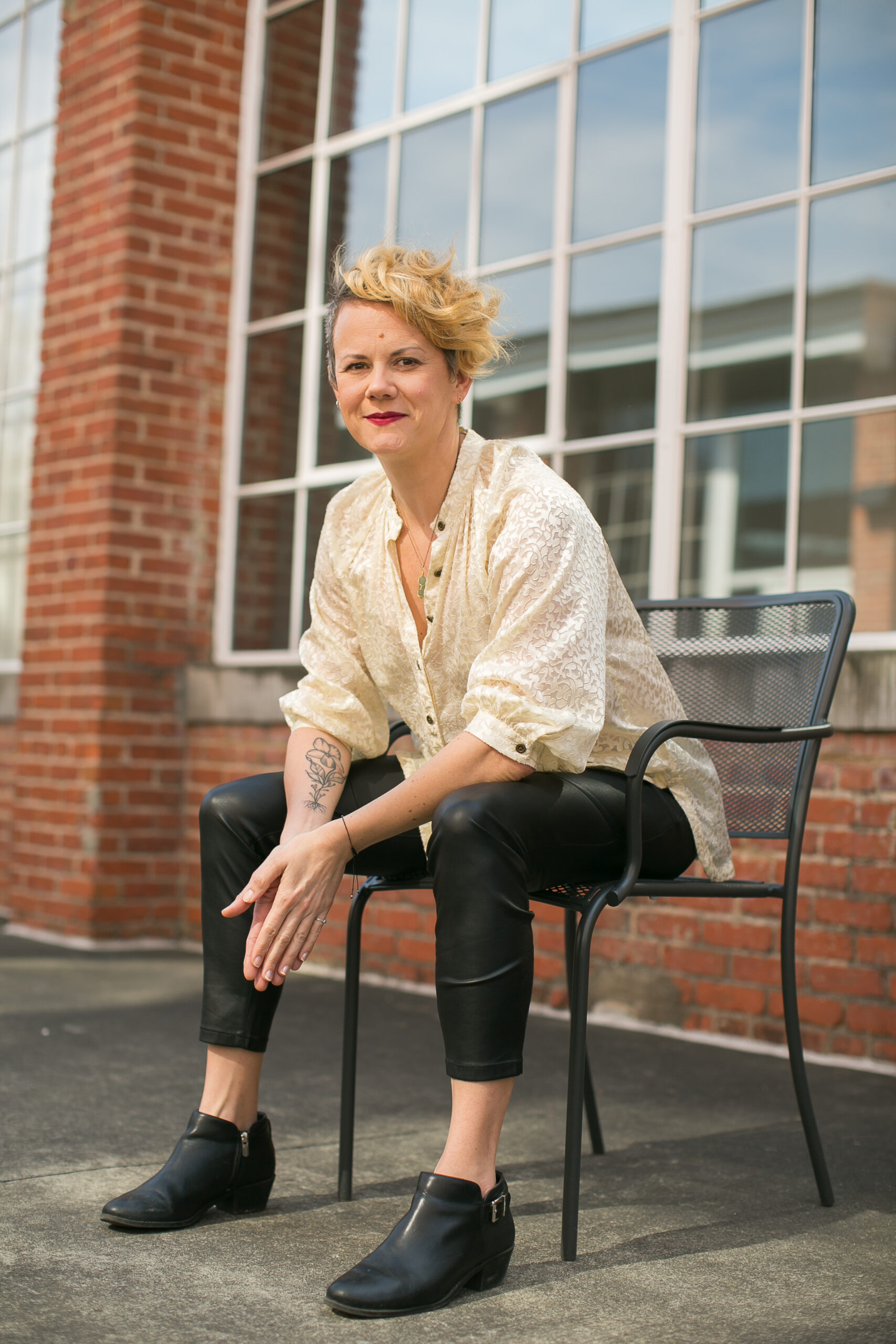 Bridget Bell’s debut poetry collection—All That We Ask of You Is to Always Be Happy (CavanKerry, 2025)—explores maternal mental health. She is the recipient of a North Carolina Arts Council Artist Support Grant and teaches composition and literature at Durham Technical Community College. Additionally, she pours points at Ponysaurus Brewery in Durham, NC and proofreads for Four Way Books, a literary press based in Manhattan. Originally from Toledo, Ohio, she is a graduate of Sarah Lawrence’s MFA program in creative writing. You can find her online at bridgetbellpoetry.com.
Bridget Bell’s debut poetry collection—All That We Ask of You Is to Always Be Happy (CavanKerry, 2025)—explores maternal mental health. She is the recipient of a North Carolina Arts Council Artist Support Grant and teaches composition and literature at Durham Technical Community College. Additionally, she pours points at Ponysaurus Brewery in Durham, NC and proofreads for Four Way Books, a literary press based in Manhattan. Originally from Toledo, Ohio, she is a graduate of Sarah Lawrence’s MFA program in creative writing. You can find her online at bridgetbellpoetry.com.
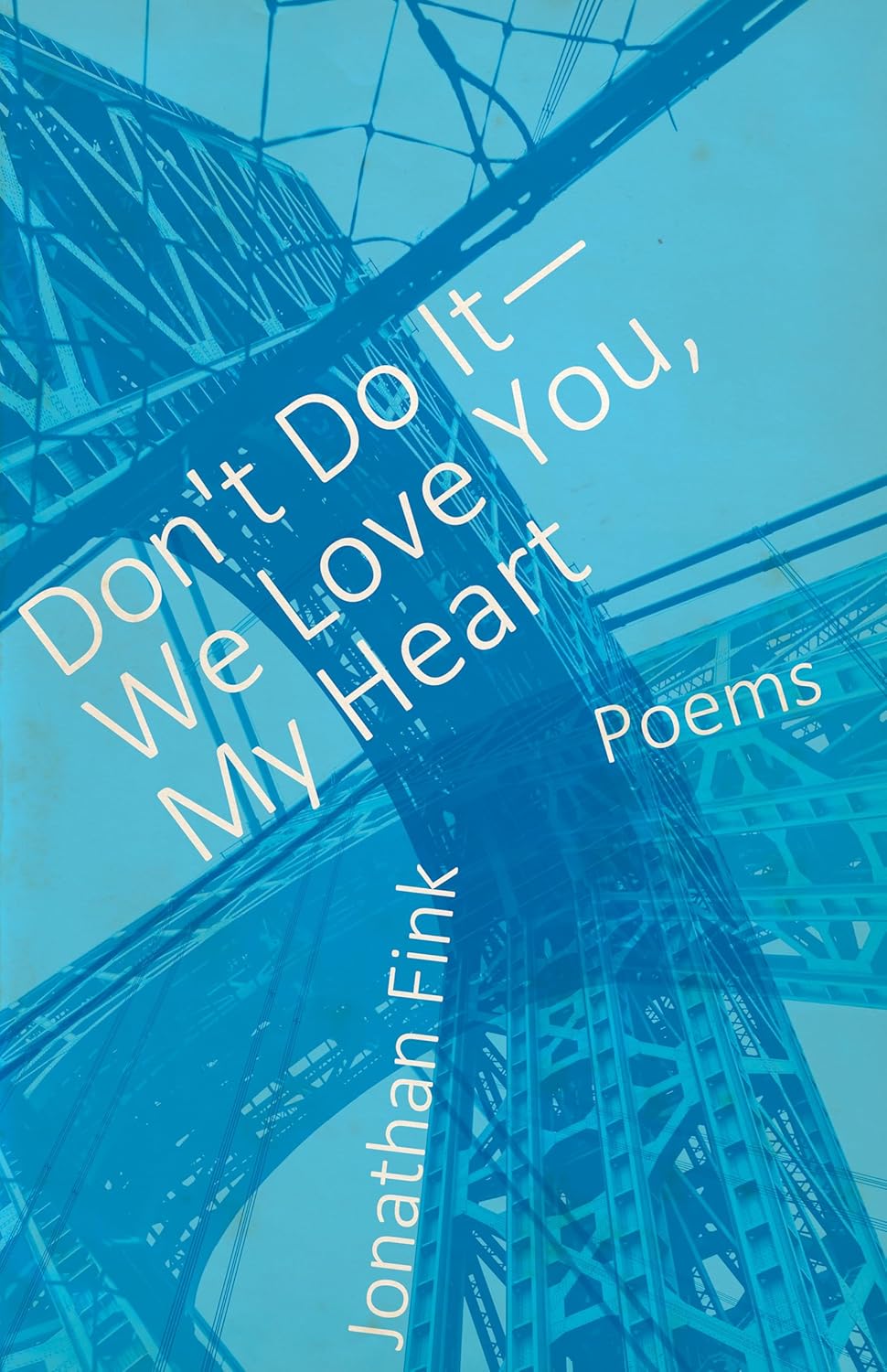
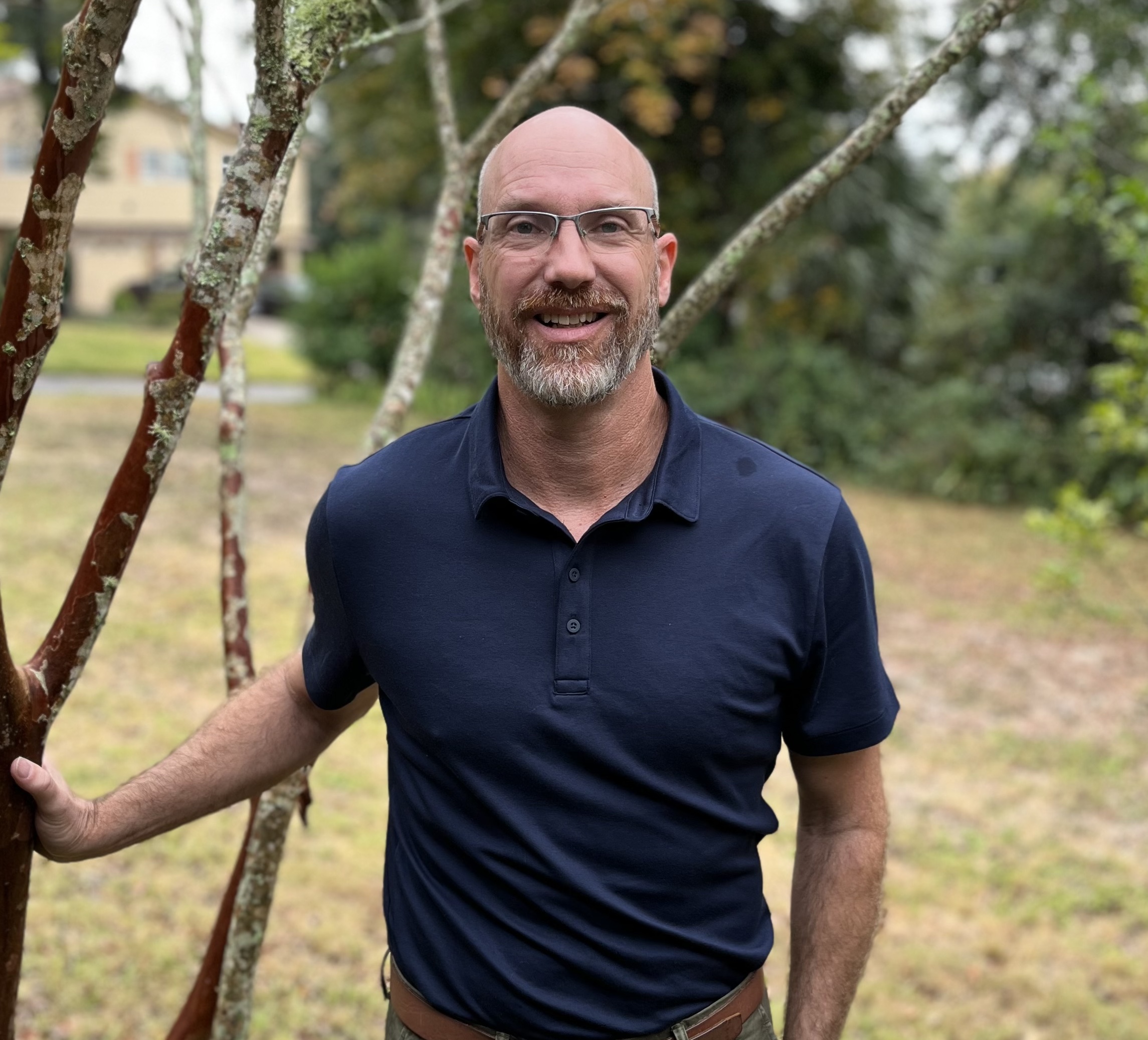 Jonathan Fink is Professor and Coordinator of Creative Writing at University of West Florida. His most recent book of poetry is Don’t Do It—We Love You, My Heart (Dzanc, 2025). He has also received the Editors’ Prize in Poetry from The Missouri Review, the McGinnis-Ritchie Prize for Nonfiction/Essay from Southwest Review, the Porter Fleming Award in Poetry, and fellowships from the National Endowment for the Arts, Joshua Tree National Park, the Florida Division of Cultural Affairs, and Emory University, among other institutions.
Jonathan Fink is Professor and Coordinator of Creative Writing at University of West Florida. His most recent book of poetry is Don’t Do It—We Love You, My Heart (Dzanc, 2025). He has also received the Editors’ Prize in Poetry from The Missouri Review, the McGinnis-Ritchie Prize for Nonfiction/Essay from Southwest Review, the Porter Fleming Award in Poetry, and fellowships from the National Endowment for the Arts, Joshua Tree National Park, the Florida Division of Cultural Affairs, and Emory University, among other institutions.
 Amy Stuber has published fiction in New England Review, Missouri Review, Copper Nickel, and elsewhere. She’s a flash editor at Split Lip Magazine. Her debut collection, SAD GROWNUPS, comes out October 8 from Stillhouse Press.
Amy Stuber has published fiction in New England Review, Missouri Review, Copper Nickel, and elsewhere. She’s a flash editor at Split Lip Magazine. Her debut collection, SAD GROWNUPS, comes out October 8 from Stillhouse Press.
 Pat Spears is the author of three novels and numerous short stories. Her second novel, It’s Not Like I Knew Her, won the bronze medal for Foreword Review’s Book of the Year in LGBTQ Fiction. Her short stories have appeared in numerous journals, including North American Review, Sinister Wisdom, Appalachian Heritage, Common Lives, Lesbian Lives, and Seven Hills Review, and anthologies including Law and Disorder (Main Street Rag), Bridges and Borders (Jane’s Stories Press), Saints and Sinners: New Fiction from the Festival 2012, and Walking the Edge: A Southern Gothic Anthology (Twisted Road Publications). She is a sixth generation Floridian and lives in Tallahassee, Florida with her partner, two dogs, and one rabbit.
Pat Spears is the author of three novels and numerous short stories. Her second novel, It’s Not Like I Knew Her, won the bronze medal for Foreword Review’s Book of the Year in LGBTQ Fiction. Her short stories have appeared in numerous journals, including North American Review, Sinister Wisdom, Appalachian Heritage, Common Lives, Lesbian Lives, and Seven Hills Review, and anthologies including Law and Disorder (Main Street Rag), Bridges and Borders (Jane’s Stories Press), Saints and Sinners: New Fiction from the Festival 2012, and Walking the Edge: A Southern Gothic Anthology (Twisted Road Publications). She is a sixth generation Floridian and lives in Tallahassee, Florida with her partner, two dogs, and one rabbit.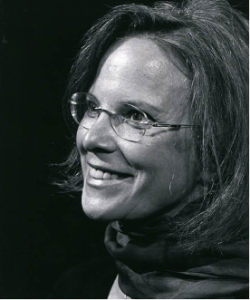 Carolyn Forché is the author of five books of poetry, most recently In the Lateness of the World(Penguin Press, 2020), a finalist for the Pulitzer Prize, and also Blue Hour (2004), a finalist for the National Book Critics Circle Award, The Angel of History(1995), winner of the Los Angeles Times Book Award, The Country Between Us(1982), winner of the Lamont Prize of the Academy of American Poets, and Gathering the Tribes (1976), winner of the Yale Series of Young Poets Prize.
Carolyn Forché is the author of five books of poetry, most recently In the Lateness of the World(Penguin Press, 2020), a finalist for the Pulitzer Prize, and also Blue Hour (2004), a finalist for the National Book Critics Circle Award, The Angel of History(1995), winner of the Los Angeles Times Book Award, The Country Between Us(1982), winner of the Lamont Prize of the Academy of American Poets, and Gathering the Tribes (1976), winner of the Yale Series of Young Poets Prize.